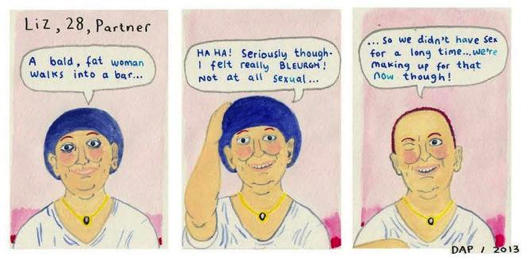
By Jamie Stewart
Manchester Metropolitan University’s (Manchester Met) Humanities in Public festival continued its ‘SEX’ strand last night with an open and frank discussion about Sex, Sexuality and Cancer. The event brought together people with personal experience of cancer, medical practitioners and the general-public to discuss how barriers can be broken down.
Dr Natalie Hammond, Senior Lecturer from the Manchester Met Department of Social Care and Social Work, began the evening by talking about the Phoenix Project: Surviving Cancer. The project looks at issues surrounding cancer, focusing on sexuality and relationships. Hammond’s team interviewed cancer survivors, with a focus on their lived experiences.
Graphic artists were then given excerpts from the interviews in order to provide accompanying artwork for the project. The resulting images are intimate and provocative. They act to change the perception of what it means to have had cancer but the images also have a deeper meaning in that they can help cancer survivors come to terms with the effects of cancer on their relationships and sex lives. The Phoenix Project stresses the important role that art can play in the discussion of the taboo. By using the comic form, the patient is able to reflect on their own experiences in a simple and visual way.
The aim of this event was to break the stigma that often surrounds issues of sex and cancer. One way in which Dr Jac Saorsa (Visual Artist and Director of the Broadway Drawing School in Cardiff) has done this is, again, through art. Dr Saorsa explained the intricate connection between art and science in her work, “I use the body as form, and psyche as content.”
In her Drawing Women’s Cancer project, Dr Saorsa aims to highlight the existence of gynaecological cancers, as well as change the way that cancer is seen by the public through exhibitions and social engagement. By bringing personal narratives of illness in to the public sphere, Drawing Women’s Cancer alters how cancer is perceived, and places importance on the emotional aspects of experience.
Dr Brian Lobel, from the University of Chichester, spoke about his own experiences of cancer and illuminated how cancer affects people differently depending on their age at the time of diagnosis. He championed a more ‘person-centred’ approach to dealing with the emotional aspects of cancer, highlighting that cancer patients in their teens miss out on important sexual education classes, as well as their own lived experiences.
Lobel furthered the connection between art and science, this time using theatre to channel the anxiety around his own experience of cancer. He spoke about the scientific and often alienating language as well as the awkward silences that often surround cancer and how his experience as a cancer patient affected his relationships.
Through comedy and theatre, Lobel questioned the conservative attitude people adopt around both sex and cancer. He also highlighted how medical professionals tend to focus on the reproductive challenges cancer patients face, leaving questions of intimacy and pleasure unanswered. He explained that he is interested in how performance can shift perspective of diagnosis.
Professor Jackie Stacey, from the University of Manchester, spoke about her own diagnosis of cancer at the age of 31. Stacey likened the word ‘cancer’ to the word ‘lesbian’, and argued that, for her, both words produce anxiety as well as social stigma. Stacey, like Lobel, focused on the body as the site cancer experience, stressing that chemotherapy often has a desexualising or infantilising effect on the body.
Stacey also touched upon how her diagnosis led to research into the perceptions, theory, and experience of cancer in contemporary society and culture. Her book Teratologies: A Cultural Study of Cancer explores biomedical accounts of the causes of the disease, but also engages with broader areas such as definitions of cancer and feminist debates around the history of science.
As one audience member explained, the taboo that surrounds sexuality and cancer is not specific to cancer alone, but to other long-term chronic illnesses. He suggested that talking about these issues, and using art as a pathway into them, can only generate more positive and open attitudes to sex and illness.
For more information about the work of some of the panel at the Sex, Sexuality and Cancer event, please visit the following links:
Dr Brian Lobel funwithcancerpatients.com
Dr Jac Saorsa drawingcancer.wordpress.com
For more information about the upcoming events in the ‘SEX’ season, see the Humanities in Public festival’s webpage






Leave a reply